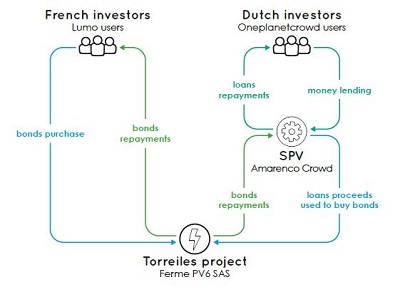Solar parks proliferate in Europe and boost development of renewables, but the issue of land use is often raised. A new trend is to produce energy and cultivate crops at the same time, in other words use agrivoltaic systems.
One example is the Torreilles solar park, in the South West of France. The plant’s total power capacity is 9.6MW and stretches for 43 hectares along the so-called “Route du soleil”, near Perpignan. It can produce 14,000,000 kWh per year, enough to supply 5,200 families or allow 1,400 electric cars to travel around the world, saving 1,100 tons of CO2.
The system consists of 96 greenhouses equipped with solar panels. It hosts an “organic" poultry farm, which is free-range, with the animals fed on grains grown on site. Fruit plants are also grown, with a section for exotic species.
The Torreilles park is innovative not only for its structure, but also for its financing system linked to a European cross-border campaign to crowdfund renewables. Platforms Lumo, based in France, and Oneplanetcrowd, in the Netherlands, co-financed the project collecting 800 thousand euros in two rounds, coming from 350 French investors, and 130 Dutch investors.
Nowadays, starting a campaign involving projects and investors from different European countries is not easy. “Investment regulations are not harmonised between States,” Olivier Houdaille, general director of Lumo, tells youris.com, “The biggest challenges were to make sure that no rule was breached and that investors understood the proposed framework.”
“Simply said, a platform can only offers its services in its own country, unless it gets a permit in each country where it’s active. Thus crowdfunding, also born to streamline bureaucratic procedures, ends up mediating between different regulatory frameworks,” explains Maarten de Jong, general director of Oneplanetcrowd. “We met Lumo during the EU project Crowdfundres and we were both eager to make a crossborder project work. So we discussed and jointly developed a solution to allow investors from both countries to have the same financial conditions.
“The owner of the park (the Irish renewable energy developer Amarenco) set up a dedicated intermediate structure, with a governance granting Lumo with the required control to protect investors’ interests,” explains Houdaille. The local entity, called Amarenco Crowd SAS, is a special purpose vehicle (SPV) to which the investors of Oneplanetcrowd provided a loan. Lumo was in the board of this entity.

With the capital of the crowd, the SPV bought bonds issued by the Torreilles project entity, Ferme PV6 SAS. The payments of the bonds are then used to repay, through the Oneplanetcrowd platform, the Dutch investors who, thanks to this solution, have had the same financial conditions (three-year payback period, five percent annual interest rate) as the investors of Lumo.
“With this campaign French and Dutch investors contributed together to fund the same project, managed by a platform of its own regulatory area,” says Houdaille.
Many of the constraints limiting the action of the platforms result from the lack of a European crowdfunding market. "A EU wide crowdfunding license would be ideal but is not realistic at this point in time,” claims de Jong. “The best option would be to make the MiFID license really work as a passport, giving easy access to all the EU nations. This is not the case. Local limitations apply even though you have MiFID.” (Editor’s Note: the “Markets in Financial Instruments Directive” has been in force since 2007. It will be updated in 2018 to increase transparency across the EU financial markets. The current EU regime provides a reasonable degree of risk mitigation, due to disclosure requirements and classification of risk profiles of the investors).
Lumo and Oneplanetcrowd have opened up a path. The Torreilles scheme is tailor-made for French and Dutch rules but “it could possibly be extended to other European countries,” Houdaille says. Nevertheless, action at the EU level is required, he adds: “We proved that we can somehow partially overcome the obstacles by ourselves, but the cost of it is a burden on platforms. The equivalent money and energy could be saved and then reallocated to launch more crowdfunding campaigns.”
youris.com provides its content to all media free of charge. We would appreciate if you could acknowledge youris.com as the source of the content.